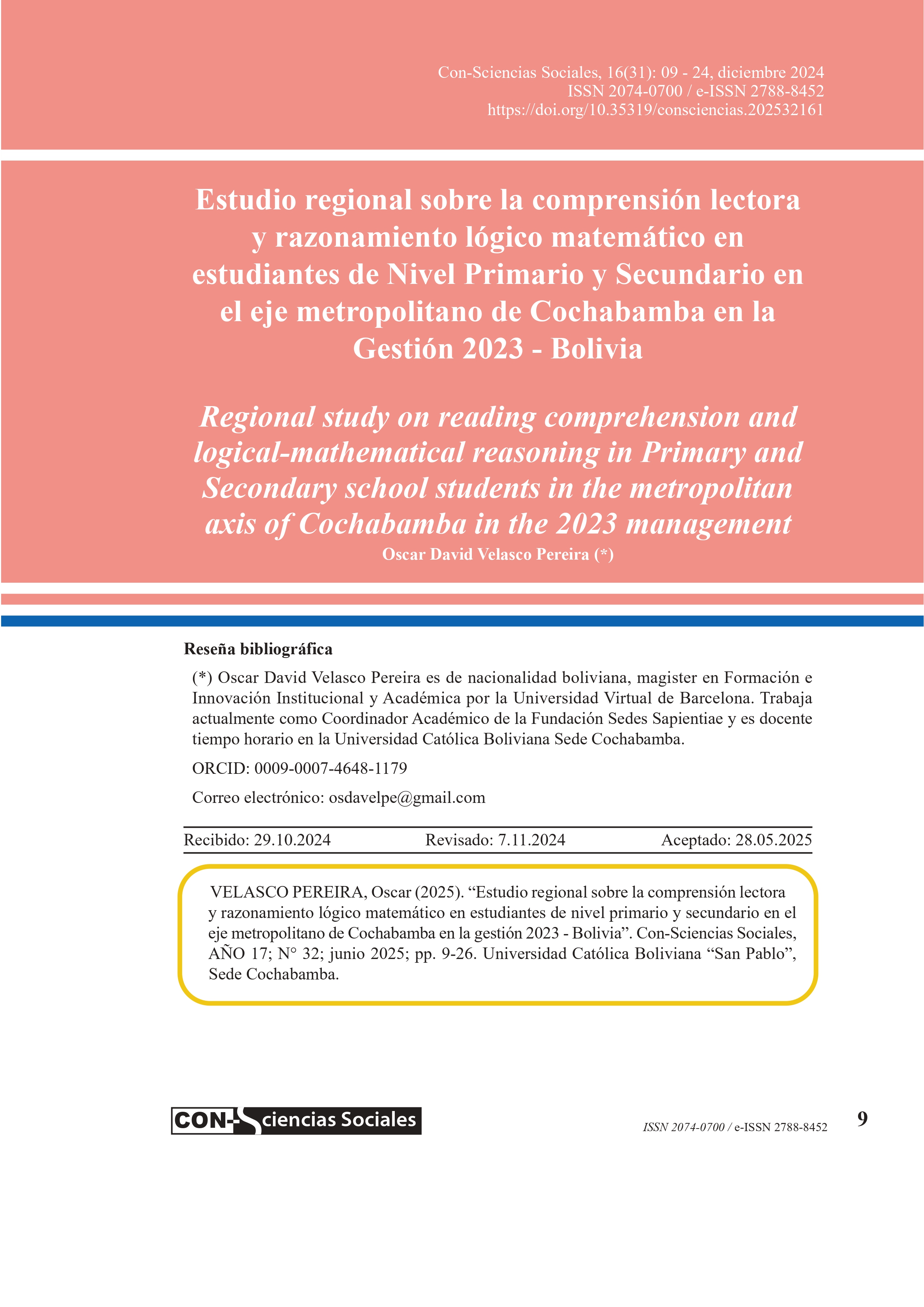Regional study on reading comprehension and logical-mathematical reasoning in primary and secondary school students in the metropolitan axis of Cochabamba in the 2023 management
DOI:
https://doi.org/10.35319/consciencias.202532161Keywords:
Basic skills, Reading comprehension, Mathematical logical reasoningAbstract
This study forms part of a comprehensive evaluation of educational quality, focusing specifically on understanding the status of fundamental competencies achieved by students in reading comprehension and mathematical logical reasoning. The assessment encompassed 3rd and 6th grade primary students and 4th and 6th grade secondary students from educational institutions in the municipalities of Cochabamba's central axis during the 2023 academic year. This research addresses the critical gap in official information regarding these basic competencies, which fall under the school's educational mandate. This research employed a mixed-methods approach within an interpretive framework. The quantitative component enabled a systematic assessment of students' capacity development levels, while the qualitative component explored teachers' perceptions regarding students' performance in these competencies and identified potential influencing factors. The results indicated that students from both educational levels and across all evaluated grades performed within the "developing" range, which is classified as "failed" according to the Ministry of Education's assessment scale. Most concerning was the finding that deductive inferential comprehension and critical thinking levels were the least developed areas among students. Similarly, in mathematical logical reasoning, students from both educational levels and across all grades scored within the "developing" range, equivalent to "failed" according to official assessment standards. The most significant deficiency identified was in the application of learning to problem-solving situations.
Downloads
References
Arias Ortiz, E., y otros (2024). El estado de la educación en América Latina y el Caribe: La medición de los aprendizajes. Banco Interamericano de Desarrollo.
Bloom, B. S. (1956). Taxonomía de los objetivos educativos: La clasificación de los objetivos educativos. Handbook I: Cognitive domain. David McKay Company.
Baroody, A. J. (2005). “Desarrollar formas eficientes de enseñar la suma y la resta”. En J. Kilpatrick, J. Swafford y B. Findell (Eds.), Sumando: Ayudando a los niños a aprender matemáticas (pp. 65-102). Editorial de las Academias Nacionales.
Campaña Boliviana por Derecho a la Educación (2024) Situación de la educación en Bolivia. Un aporte de la sociedad civil en Educación. Editorial Grafic Printer.
Ferreiro, E. (2006). La escritura en el desarrollo del niño. Ediciones Morata.
Hanushek, E. A., & Woessmann, L. (2011). The economics of international differences in educational achievement. Handbook of the Economics of Education, 3, 89-200. DOI: https://doi.org/10.1016/B978-0-444-53429-3.00002-8
IEA (Asociación Internacional para la Evaluación del Rendimiento Educativo). (2017). PIRLS 2016 Resultados Internacionales en Lectura. Boston College, Centro de Estudios Internacionales TIMSS & PIRLS.
Kane, T. J. (2013). Validating teacher effect estimates using randomized experiments. Economics of Education Review, 30(1), 66-77.
Ministerio de Educación (2022). Lineamientos Curriculares del Subsistema de Educación Regular – 2023, La Paz, Bolivia
Ministerio de Educación (2023). Reglamento de evaluación del desarrollo curricular del Subsistema de Educación Regular – 2023, La Paz, Bolivia.
Palacios (2003). La enseñanza de la lectura y la escritura en la educación infantil. Ediciones Pirámide.
Piaget, J. (2001). La formación del símbolo en el niño: I. El juego, la imagen y la representación. (2ª ed.). Ediciones Morata., S. M. (2ed.). Ediciones Morata.
Popham, W. J. (2001). The truth about testing: An educator's call to action. ASCD.
Snow, C. E., & Sweet, A. P. (2003). “Repensando la comprensión lectora”. En: A. P. Sweet & C. E. Snow (Eds.), Rethinking reading comprehension (pp. 1-11). Guilford Press.
UNESCO. (2020). Informe de seguimiento de la educación en el mundo 2020: Inclusión y educación – Todos significa todos. UNESCO. https://unesdoc.unesco.org/ark:/48223/pf0000373718

Published
How to Cite
Issue
Section
License
Copyright (c) 2025 Revista Con-Sciencias Sociales

This work is licensed under a Creative Commons Attribution-NonCommercial 4.0 International License.









